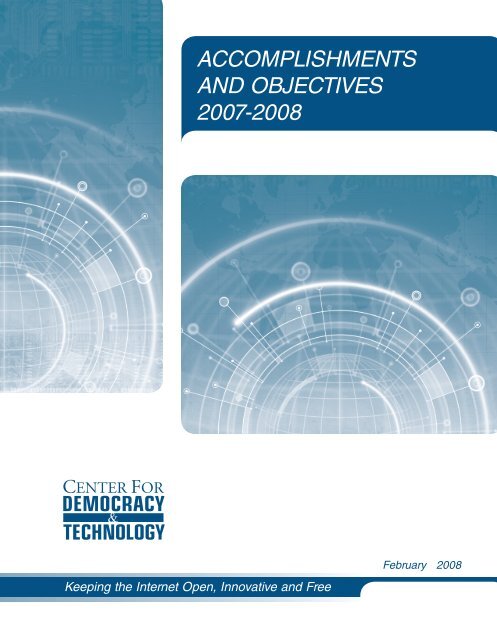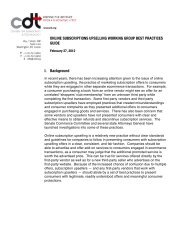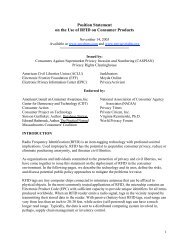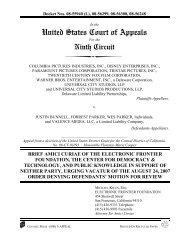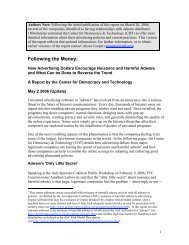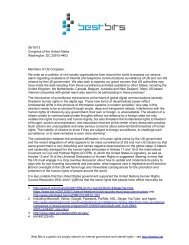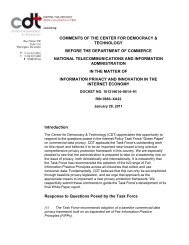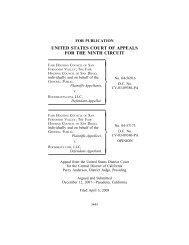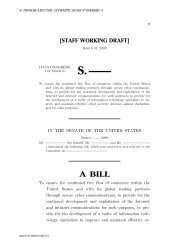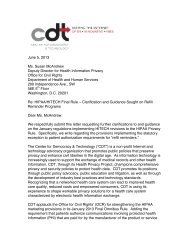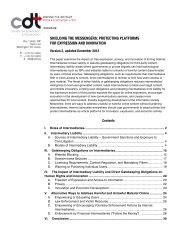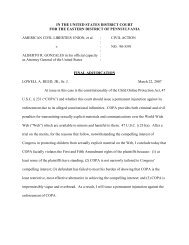hi-res pdf - Center for Democracy and Technology
hi-res pdf - Center for Democracy and Technology
hi-res pdf - Center for Democracy and Technology
You also want an ePaper? Increase the reach of your titles
YUMPU automatically turns print PDFs into web optimized ePapers that Google loves.
Accomplishments<br />
And objectives<br />
2007-2008<br />
Keeping the internet open, innovative <strong>and</strong> Free<br />
February 2008
The <strong>Center</strong> <strong>for</strong> <strong>Democracy</strong> & <strong>Technology</strong> is a non-profit, non-partisan public inte<strong>res</strong>t<br />
organization dedicated to developing <strong>and</strong> implementing public policies to protect <strong>and</strong> advance<br />
civil liberties <strong>and</strong> democratic values on the Internet.<br />
1634 I Street, NW Suite 1100<br />
Was<strong>hi</strong>ngton DC 20006<br />
(202) 637-9800<br />
(202) 637-0968 (fax)<br />
http://www.cdt.org<br />
Copyright ©2008 <strong>Center</strong> <strong>for</strong> <strong>Democracy</strong> & <strong>Technology</strong>
Table of Contents<br />
Letter from the P<strong>res</strong>ident ...........................................................................................................iii<br />
Issue Area Reports<br />
Catalog of Activities<br />
Free Exp<strong>res</strong>sion ......................................................................................................1<br />
Consumer Privacy ................................................................................................3<br />
Security <strong>and</strong> Freedom ..........................................................................................5<br />
Copyright ................................................................................................................8<br />
Internet Arc<strong>hi</strong>tecture .........................................................................................10<br />
Digital <strong>Democracy</strong> ..............................................................................................12<br />
Global Internet ....................................................................................................14<br />
Publications .........................................................................................................16<br />
Testimony <strong>and</strong> Appearances be<strong>for</strong>e Government Agencies .................... 17, 18<br />
Staff ..............................................................................................................................................19<br />
Board of Directors ......................................................................................................................20
Letter from the P<strong>res</strong>ident<br />
In the small space between the accomplishments of the last year <strong>and</strong> challenges that lie ahead, there is<br />
room to pause <strong>and</strong> reflect. CDT has much to be proud of about its work in 2007. Throughout the year,<br />
CDT once again played a crucial role in protecting Internet openness, innovation <strong>and</strong> freedom. Policymakers,<br />
journalists, companies <strong>and</strong> other public inte<strong>res</strong>t organizations continued to seek our insight,<br />
reasoned analysis <strong>and</strong> thoughtful leaders<strong>hi</strong>p, <strong>and</strong> we continued to develop solutions to emerging policy<br />
challenges through dialogue, consultation <strong>and</strong> collaboration.<br />
Among its many accomplishments in 2007, CDT:<br />
• Stood as the <strong>for</strong>emost defender of free exp<strong>res</strong>sion<br />
online <strong>and</strong> particularly of social networking, w<strong>hi</strong>ch<br />
faced at the state <strong>and</strong> federal level a host of unworkable<br />
c<strong>hi</strong>ld safety proposals that would undermine the<br />
rich potential of the medium;<br />
• Was called on by Cong<strong>res</strong>s again <strong>and</strong> again to testify<br />
on legislation to <strong>res</strong>tore judicial oversight of intelligence<br />
agency surveillance <strong>and</strong> protect privacy in<br />
government programs <strong>for</strong> the collection, sharing <strong>and</strong><br />
mining of data;<br />
• Worked with regulators, industry <strong>and</strong> consumer advocates<br />
to develop innovative approaches to behavioral<br />
targeting to give consumers more control over<br />
the use of their personal in<strong>for</strong>mation;<br />
• Continued to make the case <strong>for</strong> Internet neutrality <strong>and</strong><br />
openness, focusing the discussion by convening leading<br />
technologists to analyze network management<br />
practices <strong>and</strong> p<strong>res</strong>enting the findings to key regulators;<br />
Leslie Harris<br />
• Launched an important new project on online identity,<br />
w<strong>hi</strong>ch convened stakeholders to develop <strong>and</strong> release<br />
draft Privacy Principles <strong>for</strong> the Digital Age, to guide the development of identity systems;<br />
• Led a broad-based coalition of advocacy groups <strong>and</strong> trade associations that filed an important<br />
amicus brief opposing copyright liability <strong>for</strong> remote DVR storage;<br />
• Led the Anti-Spyware Coalition’s continued assault on the scourge of spyware by releasing best<br />
practices that will sharpen the effectiveness of anti-spyware tools;<br />
• Partnered with Business <strong>for</strong> Social Responsibility to convene the Internet industry, human rights<br />
groups, investors, academics <strong>and</strong> other key stakeholders to draft voluntary corporate <strong>res</strong>ponsibility<br />
principles to <strong>res</strong>pond to increasing challenges to free exp<strong>res</strong>sion <strong>and</strong> privacy on the global<br />
Internet;<br />
• Promoted e-government <strong>and</strong> the public’s access to government in<strong>for</strong>mation through digital technologies,<br />
releasing an important report about the lack of searchability of key government websites<br />
<strong>and</strong> exp<strong>and</strong>ing our groundbreaking OpenCRS site to over six million downloads.<br />
Also last year, our Board completed the transition of CDT's leaders<strong>hi</strong>p by electing me P<strong>res</strong>ident <strong>and</strong> CEO<br />
<strong>and</strong> Jerry Berman Chairman. With Ari Schwartz <strong>and</strong> Jim Dempsey joining me in day-to-day management,<br />
<strong>and</strong> with Jerry retaining an important strategic role, we have a strong team.<br />
iii<br />
Accomplishments <strong>and</strong> Objectives 2007-2008
iv<br />
The political season guarantees that 2008 will be a year of extraordinary change, bringing a unique set of<br />
opportunities <strong>and</strong> challenges across the entire portfolio of our organization. Regardless of the outcome of<br />
the P<strong>res</strong>idential election, we will be ready to p<strong>res</strong>ent to the new P<strong>res</strong>ident <strong>and</strong> Cong<strong>res</strong>s a <strong>for</strong>ward-looking<br />
<strong>and</strong> ambitious policy blueprint <strong>for</strong> the Internet, based on CDT’s core principles. Our transition document<br />
will p<strong>res</strong>ent a vision <strong>for</strong> a global digital policy framework that safeguards privacy, <strong>res</strong>pects civil liberties<br />
<strong>and</strong> provides a robust <strong>and</strong> open plat<strong>for</strong>m <strong>for</strong> innovation, economic empowerment <strong>and</strong> democratic discourse.<br />
We will be reac<strong>hi</strong>ng out to our diverse community of supporters <strong>for</strong> advice as we move along. We<br />
also plan to galvanize the Internet community to urge c<strong>and</strong>idates at all levels to make a commitment to<br />
Internet freedom during the campaign season. At the same time, we will remain vigilant in <strong>res</strong>isting the<br />
constant p<strong>res</strong>sure to erode the freedoms we have fought to defend these last 14 years.<br />
T<strong>hi</strong>s year we will broaden our privacy portfolio with a major new initiative, add<strong>res</strong>sing the issue of health<br />
in<strong>for</strong>mation privacy <strong>and</strong> technology. We are confident that our broader expertise in privacy <strong>and</strong> technology<br />
will add significant value to the development of sound policies <strong>and</strong> practices <strong>for</strong> the exchange of health<br />
in<strong>for</strong>mation.<br />
We are also launc<strong>hi</strong>ng a campaign to secure CDT’s future <strong>and</strong> build our capacity to take on new projects<br />
<strong>and</strong> <strong>res</strong>pond to growing challenges here <strong>and</strong> abroad. Each year, we are called on to do more with the same<br />
<strong>res</strong>ources. We must exp<strong>and</strong> our technical skills <strong>and</strong> <strong>res</strong>ources, participate more fully in global Internet<br />
policy <strong>for</strong>ums, <strong>and</strong> grow our p<strong>res</strong>ence in Silicon Valley. We will be asking you all to work with us to build<br />
<strong>for</strong> CDT a larger <strong>and</strong> more diverse funding base that includes a strong core of individual supporters <strong>and</strong><br />
provides working capital that will allow us to meet emerging challenges.<br />
As we begin t<strong>hi</strong>s new year, CDT is grateful to be supported by a committed <strong>and</strong> talented community. Our<br />
effectiveness is enriched by the diverse perspectives you bring to our work <strong>and</strong> by your willingness to engage<br />
in dialogue <strong>and</strong> consensus building. If the hallmark of Internet 2.0 is community <strong>and</strong> collaboration,<br />
it’s fair to say that CDT has been “doing” Internet 2.0 since the medium was in its infancy. Together, we<br />
have insisted that freedom can indeed exist side-by-side with security, that an open plat<strong>for</strong>m is key to innovation<br />
<strong>and</strong> free exp<strong>res</strong>sion, <strong>and</strong> that users must be empowered to protect their privacy <strong>and</strong> control their<br />
Internet experience. We have offered pragmatic <strong>and</strong> workable policy solutions that honor those values.<br />
There is much more to do. We are humbled by our opportunities <strong>and</strong> privileged to st<strong>and</strong> in the gap as<br />
advocates of Internet openness, innovation <strong>and</strong> freedom. We know that none of t<strong>hi</strong>s would be possible<br />
without your continued, generous support.<br />
I thank you <strong>for</strong> making it all possible,<br />
Leslie Harris<br />
Accomplishments <strong>and</strong> Objectives 2007-2008
<strong>Center</strong> <strong>for</strong> <strong>Democracy</strong> & <strong>Technology</strong> 1<br />
Free Exp<strong>res</strong>sion<br />
Soon after CDT was founded in 1994, we staked our claim in cyberspace – defending free exp<strong>res</strong>sion on<br />
the Internet by challenging the Communications Decency Act, the first ever legislative attempt to regulate<br />
online speech. We won that battle, educated an entire generation of Netizens, not to mention more than a<br />
few members of the federal judiciary, <strong>and</strong> <strong>for</strong> the first time proved that Internet users could be galvanized<br />
into action <strong>and</strong> united under a common banner.<br />
More than a decade later the fruits of that victory<br />
are evident, as the Internet community has exploded<br />
with new <strong>for</strong>ms of content <strong>and</strong> interactivity. Yet<br />
the challenge of protecting the Internet, ensuring<br />
the growth of artistic, political <strong>and</strong> social exp<strong>res</strong>sion,<br />
remains a top priority <strong>for</strong> CDT.<br />
Over the past year, CDT was the primary advocacy<br />
group working be<strong>for</strong>e Cong<strong>res</strong>s <strong>and</strong> state officials<br />
to deflect proposals to <strong>res</strong>trict young people’s access<br />
to social networks or otherwise regulate the burgeoning world of social networking. CDT helped<br />
to convince leading Members of Cong<strong>res</strong>s to focus attention not on regulating these new online environments,<br />
but on providing <strong>res</strong>ources <strong>for</strong> educating young people about how to stay safe online.<br />
Notwithst<strong>and</strong>ing the strong <strong>and</strong> consistent protection of free speech that the federal courts af<strong>for</strong>d to the<br />
Internet, policymakers at the state, federal <strong>and</strong> international level continue to propose new laws that would<br />
censor or <strong>res</strong>trict a broad range of online content. The U.S. Cong<strong>res</strong>s last year advanced an unprecedented<br />
number of c<strong>hi</strong>ld-protection measu<strong>res</strong> that raise grave threats to free exp<strong>res</strong>sion online.<br />
CDT strongly believes that parents should be able to protect their c<strong>hi</strong>ldren from inappropriate online<br />
content <strong>and</strong> contacts, <strong>and</strong> we have long advocated that the right way to help families navigate the online<br />
environment is through education <strong>and</strong> parental use of technological tools that tailor c<strong>hi</strong>ldren’s online<br />
experiences. Laws that <strong>for</strong>ce Internet providers to be gatekeepers or put <strong>res</strong>trictions on content are both<br />
ineffective <strong>and</strong> unconstitutional.<br />
2007 Accomplishments<br />
Defending Social Networking <strong>and</strong> the “Web<br />
2.0” Internet: As more <strong>and</strong> more sites allow users<br />
to interact <strong>and</strong> collaborate – to communicate,<br />
to organize, <strong>and</strong> to create new content – CDT has<br />
been the leading civil liberties voice in both Cong<strong>res</strong>s<br />
<strong>and</strong> the states to allow these new modes of<br />
creativity to emerge <strong>and</strong> grow without burdensome<br />
<strong>and</strong> constitutionally suspect regulation <strong>and</strong><br />
<strong>res</strong>trictions. Some lawmakers are trying to <strong>res</strong>trict<br />
access to these new online tools, w<strong>hi</strong>ch are<br />
energizing young people to engage <strong>and</strong> be active<br />
in political discourse <strong>and</strong> campaigns. CDT has to<br />
date successfully <strong>res</strong>isted these legislative proposals,<br />
including age verification m<strong>and</strong>ates <strong>and</strong> pro<strong>hi</strong>bitions<br />
on minors’ access to social networking.<br />
CDT is the primary advocacy<br />
group working be<strong>for</strong>e Cong<strong>res</strong>s <strong>and</strong><br />
state officials to deflect proposals<br />
<strong>res</strong>tricting access to, or trying to<br />
regulate, social networks.<br />
Fighting to P<strong>res</strong>erve Internet Freedoms in a Converged<br />
World: Working to guard the free speech<br />
victory we ac<strong>hi</strong>eved in the 1997 Communications<br />
Decency Act litigation, CDT has fought to protect<br />
the Internet from broadcast-style regulation. As<br />
broadcast <strong>and</strong> Internet technologies converge, <strong>and</strong><br />
as an increasing amount of content flows over the<br />
Internet, there are increasing calls from lawmakers<br />
<strong>and</strong> federal regulators to strip the Net of its<br />
<strong>hi</strong>gh level of constitutional protection <strong>and</strong> <strong>for</strong>ce on<br />
it a regulatory framework similar to that applied to<br />
broadcast content. However, citing arguments CDT<br />
made in “friend of the court” briefs, a federal court<br />
of appeals in 2007 warned the Federal Communications<br />
Commission that its authority to regulate<br />
Accomplishments <strong>and</strong> Objectives 2007-2008
2 <strong>Center</strong> <strong>for</strong> <strong>Democracy</strong> & <strong>Technology</strong><br />
broadcast content was increasingly in question.<br />
Both in the courts <strong>and</strong> in the halls of Cong<strong>res</strong>s,<br />
CDT has worked to educate policymakers, judges,<br />
<strong>and</strong> the public about the effectiveness of technology-based<br />
options <strong>for</strong> protecting c<strong>hi</strong>ldren from<br />
unwanted content. CDT continued to advocate <strong>for</strong><br />
parental empowerment as a foil to those proposing<br />
burdensome government regulation.<br />
CDT advocates <strong>for</strong> parental empowerment as more effective than burdensome<br />
government regulation.<br />
Leading the Largest-Ever Coalition Supporting<br />
Online Free Speech in the Nine-Year-Long COPA<br />
Case: Following an excellent U.S. District Court<br />
decision in March 2007 permanently enjoining the<br />
1998 COPA law, w<strong>hi</strong>ch seeks to <strong>res</strong>trict online content,<br />
CDT organized the largest group of “friends<br />
of the court” to support the decision on appeal to<br />
the U.S. Court of Appeals in P<strong>hi</strong>ladelp<strong>hi</strong>a. CDT’s<br />
amicus brief sent a powerful message to the courts<br />
on behalf of an extraordinarily broad coalition of<br />
public inte<strong>res</strong>t <strong>and</strong> human rights groups, leaders<br />
of the news <strong>and</strong> publis<strong>hi</strong>ng industries, <strong>and</strong> the six<br />
leading Internet industry associations.<br />
Defending the Free Speech Immunity Af<strong>for</strong>ded<br />
to Web <strong>and</strong> Online Service Providers: The principle<br />
that ISPs, Web hosting companies, <strong>and</strong> other<br />
online service providers should not be <strong>res</strong>ponsible<br />
<strong>for</strong> arguably unlawful content posted by others on<br />
their services is absolutely essential to being able<br />
Accomplishments <strong>and</strong> Objectives 2007-2008<br />
to keep the Internet a robust <strong>for</strong>um <strong>for</strong> free speech.<br />
Over the course of 2007, CDT joined in filing<br />
four separate amicus briefs defending service<br />
providers from attempts to impose “intermediary<br />
liability” on them.<br />
Litigating Against Unconstitutional Statutes: In<br />
2005, CDT challenged an unconstitutional Utah<br />
statute that would have <strong>for</strong>ced ISPs<br />
<strong>and</strong> web operators to limit access to<br />
lawful content. Last year, as a <strong>res</strong>ult<br />
of CDT’s lawsuit, the Utah legislature<br />
repealed one of the most egregiously<br />
unconstitutional provisions in the<br />
statute <strong>and</strong> add<strong>res</strong>sed the free speech<br />
concerns of another provision. CDT<br />
continues to pursue the constitutional<br />
claims against the remaining portions<br />
of the challenged censors<strong>hi</strong>p law.<br />
Defending the Internet Free Speech<br />
Rights of Political Speakers: In 2005,<br />
CDT successfully organized the Internet<br />
community to protect the rights<br />
of individuals to exp<strong>res</strong>s their political<br />
views online without being subject<br />
to Federal Election Commission<br />
regulation. The following year, CDT<br />
launched Net<strong>Democracy</strong>Guide.org to<br />
make sure that political activists understood<br />
their rights. In 2007, as the<br />
country moved toward the 2008 election,<br />
CDT continued to monitor the impact of new<br />
FEC rules <strong>and</strong> make sure that the Internet’s role in<br />
revolutionizing politics remained free from regulation.<br />
2008 Objectives<br />
Fight to Keep the “Networking” in Social Networking:<br />
More than 30 bills directly impacting<br />
online free speech are currently pending in Cong<strong>res</strong>s,<br />
<strong>and</strong> social networking is the censorial target<br />
of state officials across the country. CDT will<br />
vigorously <strong>res</strong>ist unconstitutional ef<strong>for</strong>ts in Cong<strong>res</strong>s<br />
<strong>and</strong> state legislatu<strong>res</strong> to regulate speech <strong>and</strong><br />
impose new burdens on social networks <strong>and</strong> other<br />
collaborative online environments. At the same<br />
time, we will promote the value of user education<br />
<strong>and</strong> user empowerment tools to protect c<strong>hi</strong>ldren in<br />
the online environment.
<strong>Center</strong> <strong>for</strong> <strong>Democracy</strong> & <strong>Technology</strong> 3<br />
Protect Online Service Providers: The Internet<br />
has flourished because Web providers are not<br />
required to serve as gatekeepers <strong>for</strong> the content<br />
posted on their sites. Without that protection, web<br />
<strong>and</strong> network operators will be unwilling to host<br />
controversial speech. The increasing challenges<br />
to the legal immunity of “intermediaries” poses a<br />
serious threat to Internet freedom <strong>and</strong> openness.<br />
CDT will continue work in the courts <strong>and</strong> legislatu<strong>res</strong><br />
to protect social networks, blogs, Web hosting<br />
companies <strong>and</strong> others from being held <strong>res</strong>ponsible<br />
<strong>for</strong> content posted by others.<br />
Consumer Privacy<br />
Litigate to Defend Free Speech: Following on<br />
our success in 2007 against unconstitutional provisions<br />
in a Utah censors<strong>hi</strong>p law, CDT will continue<br />
to litigate that case. Where possible <strong>and</strong> as needed,<br />
we will take on other cases to defend the rights of<br />
speakers on the Internet to post lawful content free<br />
from government censors<strong>hi</strong>p.<br />
Create an Online Free Speech Resource <strong>for</strong> Artists:<br />
With support from the Warhol Foundation,<br />
CDT will launch a new Web site to help artists<br />
navigate free exp<strong>res</strong>sion challenges that arise in<br />
the online environment.<br />
Privacy challenges on the Internet are growing ever more complex as “Web 2.0” services proliferate, mobile<br />
device functionality <strong>and</strong> uptake exp<strong>and</strong>, <strong>and</strong> other online trends take hold. As an increasing number of<br />
people migrate more of their daily routines online, transacting business <strong>and</strong> sharing <strong>and</strong> storing personal<br />
in<strong>for</strong>mation, they are generating data that can be used in ways they don’t underst<strong>and</strong> <strong>and</strong> aggregated into<br />
<strong>hi</strong>ghly detailed profiles. Meanw<strong>hi</strong>le, computer security breaches continue, leaving consumers<br />
apprehensive about the safety of their personal in<strong>for</strong>mation. Businesses are exploring new ways to create<br />
<strong>and</strong> manage digital identity; these technologies may help prevent fraud <strong>and</strong> identity theft but, if poorly<br />
designed or implemented, they could further jeopardize privacy <strong>and</strong> security.<br />
CDT is add<strong>res</strong>sing these challenges. We are a<br />
widely trusted advocate <strong>for</strong> consumer privacy protections<br />
that are balanced, effective <strong>and</strong> suited to<br />
the new technology. We are working to build consensus<br />
<strong>for</strong> a federal privacy law that would define<br />
the <strong>res</strong>ponsibilities of companies that collect personally<br />
identifiable data. At the same time, working<br />
with the industry, we are promoting practices<br />
that will give consumers more control over their<br />
in<strong>for</strong>mation.<br />
CDT is also a leader in ef<strong>for</strong>ts to attack the scourge of unwanted adware <strong>and</strong> spyware. Through our coordination<br />
of the Anti-Spyware Coalition, CDT is supporting the development of effective <strong>res</strong>ponses to<br />
intrusive or destructive software.<br />
2007 Accomplishments<br />
Developing Innovative Approaches to Behavioral<br />
Targeting: Behavioral targeting involves the<br />
compilation of detailed in<strong>for</strong>mation about an Internet<br />
user’s online activities <strong>and</strong> the use of those<br />
profiles to deliver customized ads as users browse<br />
the Web. Last year, five major acquisitions of online<br />
advertising firms by Internet giants, along<br />
CDT is a trusted advocate <strong>for</strong> consumer<br />
privacy protections that are<br />
balanced, effective, <strong>and</strong> suited to<br />
new technologies. CDT also leads<br />
the Anti-Spyware Coalition.<br />
with rapid changes in technology <strong>and</strong> marketing<br />
practices, brought the privacy concerns with behavioral<br />
targeting to the <strong>for</strong>efront. In conjunction<br />
with a Federal Trade Commission town hall meeting<br />
on the topic, CDT joined with nine other consumer<br />
<strong>and</strong> privacy groups in proposing a “Do Not<br />
Track List,” intended to provide consumers with<br />
Accomplishments <strong>and</strong> Objectives 2007-2008
4 <strong>Center</strong> <strong>for</strong> <strong>Democracy</strong> & <strong>Technology</strong><br />
a simple tool <strong>for</strong> opting out of behavioral targeting.<br />
The proposal served as a launc<strong>hi</strong>ng pad <strong>for</strong> a<br />
dialogue with consumer groups, companies, <strong>and</strong><br />
regulators about how to better protect consumers<br />
as online advertising continues to evolve.<br />
Making Significant Strides in Fighting Spyware:<br />
The Anti-Spyware Coalition (ASC), led by<br />
CDT, released a set of best practices <strong>for</strong> software<br />
downloaded onto consumers’ computers. Eighteen<br />
months in the making, the document details<br />
the factors by w<strong>hi</strong>ch anti-spyware companies can<br />
distinguish potentially unwanted software from<br />
products that provide real value to users. The best<br />
practices are already creating a better marketplace,<br />
serving as a vital tool <strong>for</strong> anti-spyware companies,<br />
consumers <strong>and</strong> software publishers worldwide.<br />
Meanw<strong>hi</strong>le, Consumer Reports indicated that the<br />
rate of spyware infections is falling. Experts have<br />
given credit <strong>for</strong> the decline to the ef<strong>for</strong>ts of CDT<br />
<strong>and</strong> others in promoting anti-spyware technology,<br />
en<strong>for</strong>cement of existing law, p<strong>res</strong>sure on adware<br />
advertisers, <strong>and</strong> consumer education.<br />
Building Privacy into Identity Systems: One of<br />
the central challenges of the digital age is how to<br />
identify individuals online, enhancing trust <strong>and</strong><br />
security w<strong>hi</strong>le p<strong>res</strong>erving privacy <strong>and</strong> anonymity<br />
when appropriate. In 2007, through a consultative<br />
process, CDT’s Identity Project developed draft<br />
Privacy Principles <strong>for</strong> Identity in the Digital Age.<br />
Step 1: Consumer signs up <strong>for</strong><br />
Do Not Track List through the FTC<br />
Consumer<br />
Consumer's browser downloads<br />
<strong>and</strong> receives updates to<br />
list of domains that set<br />
persistent unique identifiers*<br />
Step 2: Consumer visits Web site<br />
containing advertising<br />
FTC<br />
List of domains<br />
that set<br />
persistent unique<br />
identifiers<br />
(cookies, etc.)<br />
Web site<br />
Accomplishments <strong>and</strong> Objectives 2007-2008<br />
Domain name that<br />
sets persistent<br />
identifiers<br />
Browsers of consumers who have activated the Do Not Track List<br />
will block or delete any persistent identifiers from domains on the list<br />
Web site content<br />
<strong>and</strong> ads<br />
Operation of the Do Not Track List<br />
Ads<br />
Unveiled at an FTC authentication workshop last<br />
March, the principles explain how privacy concepts<br />
such as choice, access <strong>and</strong> accountability can<br />
guide the development of identity systems. Following<br />
the release of the draft, CDT continued to<br />
work with other privacy advocates <strong>and</strong> companies<br />
to refine the principles <strong>and</strong> develop case studies to<br />
show how they may be applied in the real world.<br />
Supporting the FTC’s Consumer Protection Mission:<br />
In 2007, CDT testified twice be<strong>for</strong>e Cong<strong>res</strong>s<br />
on the work <strong>and</strong> <strong>res</strong>ource needs of the Federal<br />
Trade Commission, urging legislators to bolster<br />
the FTC’s <strong>res</strong>ources. CDT argued that a strong FTC<br />
is needed to meet the growing challenges of spyware,<br />
online fraud, <strong>and</strong> identity theft.<br />
2008 Objectives<br />
Promote Consumer Privacy Legislation: With<br />
consumers facing an ever-growing array of privacy<br />
threats, the need grows <strong>for</strong> comprehensive federal<br />
consumer privacy legislation. Drafting such<br />
a law, however, is not easy. It requi<strong>res</strong> the kind<br />
of dialogue <strong>and</strong> consensus-building that CDT<br />
is uniquely committed to. In 2008, we will work<br />
closely with <strong>hi</strong>gh-tech businesses <strong>and</strong> the public<br />
inte<strong>res</strong>t community to develop <strong>and</strong> advocate <strong>for</strong><br />
a baseline privacy law that establishes meaningful,<br />
practical safeguards <strong>for</strong> consumers’ personal<br />
in<strong>for</strong>mation.<br />
Advertiser<br />
or<br />
Ad Network<br />
Domain that sets<br />
persistent<br />
identifiers<br />
Domain that<br />
delivers ads<br />
*Consumers may have to download a browser upgrade, plug-in,<br />
or extension in order <strong>for</strong> the Do Not Track List to work <strong>for</strong> them.<br />
CDT <strong>and</strong> nine other consumer <strong>and</strong> privacy groups proposed a “Do Not<br />
Track” list as a means to give consumers more control over their online<br />
experience.<br />
Add<strong>res</strong>s Health Privacy: In 2008,<br />
CDT will launch a major new project<br />
to add<strong>res</strong>s the complex privacy issues<br />
associated with the growing use of<br />
in<strong>for</strong>mation technology to collect <strong>and</strong><br />
exchange sensitive health records.<br />
Government agencies <strong>and</strong> the health<br />
care sector are developing health in<strong>for</strong>mation<br />
exchanges, <strong>and</strong> a growing<br />
number of companies are offering<br />
Personal Health Records services.<br />
Cong<strong>res</strong>s is considering legislation to<br />
spur adoption of health in<strong>for</strong>mation<br />
technology. However, the privacy issues<br />
associated with the growing liquidity<br />
<strong>and</strong> exchange of health in<strong>for</strong>mation<br />
remain un<strong>res</strong>olved. CDT will<br />
work with companies, public inte<strong>res</strong>t<br />
groups, st<strong>and</strong>ard setting bodies <strong>and</strong>
<strong>Center</strong> <strong>for</strong> <strong>Democracy</strong> & <strong>Technology</strong> 5<br />
policymakers to develop pragmatic, principled solutions<br />
to some of the difficult policy issues that, if<br />
unadd<strong>res</strong>sed, could impede realization of the benefits<br />
of health in<strong>for</strong>mation exchange.<br />
Develop Policies <strong>for</strong> Behavioral Targeting: Behavioral<br />
profiling will be a major focus of CDT’s<br />
consumer privacy ef<strong>for</strong>ts in 2008. Building on the<br />
proposals CDT <strong>and</strong> others p<strong>res</strong>ented to the FTC<br />
last year, CDT will convene privacy advocates,<br />
consumer groups <strong>and</strong> companies to develop balanced<br />
approaches to the practice of behavioral<br />
targeting. Our strategy will focus on protecting<br />
privacy w<strong>hi</strong>le allowing the online advertising industry<br />
to flourish. In addition, CDT will exp<strong>and</strong><br />
its e-<strong>for</strong>ensic skills <strong>and</strong> use its extensive experience<br />
to <strong>res</strong>earch <strong>and</strong> bring to light the worst actors <strong>and</strong><br />
practices in the behavioral targeting space.<br />
Combat Spyware: CDT will continue to coordinate<br />
the Anti-Spyware Coalition’s assault on spyware<br />
Security <strong>and</strong> Freedom<br />
in 2008. The Coalition has already hosted its fourth<br />
public workshop on anti-spyware ef<strong>for</strong>ts <strong>and</strong> will<br />
release guidelines <strong>for</strong> conducting tests of anti-<br />
spyware software. CDT will also offer advice to<br />
policymakers as they seek to add<strong>res</strong>s the spyware/<br />
adware problem legislatively.<br />
Promote Compliance with Government Privacy<br />
Laws: The l<strong>and</strong>mark E-Government Act of 2002,<br />
w<strong>hi</strong>ch CDT shaped, is due to be reauthorized in<br />
2008. It requi<strong>res</strong> federal government agencies to<br />
conduct privacy impact assessments (PIAs) be<strong>for</strong>e<br />
developing or procuring in<strong>for</strong>mation technology<br />
or initiating new collections of personal in<strong>for</strong>mation.<br />
As part of the reauthorization process, CDT<br />
will urge lawmakers to ensure that federal agencies<br />
comply with the law <strong>and</strong> complete their PIAs<br />
in a timely fas<strong>hi</strong>on. CDT will also continue to advocate<br />
<strong>for</strong> strengthening the now-outdated Privacy<br />
Act to add<strong>res</strong>s the complexities of government<br />
data collection in the Internet era.<br />
Since the terrorist attacks of 9/11, the nation’s civil liberties have been under assault. New laws <strong>and</strong><br />
P<strong>res</strong>idential actions have seriously eroded traditional checks <strong>and</strong> balances. Meanw<strong>hi</strong>le, technological advancements<br />
serve as an unwitting co-conspirator, allowing the government to collect, share <strong>and</strong> analyze<br />
personal in<strong>for</strong>mation, outpacing privacy protections we once took <strong>for</strong> granted.<br />
CDT is the leading organization Cong<strong>res</strong>s turns<br />
to <strong>for</strong> principled advice on balancing privacy <strong>and</strong><br />
national security. We have testified on Capitol Hill<br />
more than any other public inte<strong>res</strong>t group, consistently<br />
arguing that the vital needs of the government<br />
can be met w<strong>hi</strong>le still protecting the constitutional<br />
rights of innocent Americans. In recognition<br />
of our in-depth expertise, we are routinely consulted<br />
by Executive Branch officials. Because the<br />
digital revolution is fundamentally changing the<br />
privacy equation, CDT is taking the lead in developing a proactive agenda to strengthen privacy protections<br />
that have failed to keep pace with the march of technology. In 2008, defending innovation <strong>and</strong> privacy<br />
in the face of government surveillance dem<strong>and</strong>s will continue to be one of our priorities.<br />
2007 Accomplishments<br />
Opposing Unchecked Surveillance of International<br />
Communications: Throughout 2007, CDT<br />
<strong>and</strong> our allies in the civil liberties community op-<br />
CDT is taking the lead in developing<br />
a proactive agenda to strengthen<br />
privacy protections that have failed<br />
to keep pace with the march of<br />
technology.<br />
posed ef<strong>for</strong>ts to amend the Foreign Intelligence<br />
Surveillance Act (FISA) to authorize warrantless<br />
surveillance of the international communications<br />
of people in the United States. We testified be-<br />
Accomplishments <strong>and</strong> Objectives 2007-2008
6 <strong>Center</strong> <strong>for</strong> <strong>Democracy</strong> & <strong>Technology</strong><br />
<strong>for</strong>e Cong<strong>res</strong>s, briefed the media, <strong>and</strong> developed<br />
pragmatic recommendations on how to accommodate<br />
the needs of intelligence agencies to conduct<br />
surveillance of overseas targets with speed <strong>and</strong><br />
agility, w<strong>hi</strong>le protecting the privacy of innocent<br />
Americans.<br />
Updating the Fourth Amendment: Privacy is<br />
being eroded by trends much stronger than the<br />
changes wrought by the PATRIOT Act or the FISA<br />
amendments. Digital technology is fast outpacing<br />
Fourth Amendment privacy protections <strong>and</strong> privacy<br />
statutes such as the Electronic Communications<br />
Privacy Act. There<strong>for</strong>e, CDT has launched a<br />
proactive ef<strong>for</strong>t, the “Digital Fourth Amendment<br />
Project,” to develop support <strong>for</strong> legal re<strong>for</strong>ms that<br />
will <strong>res</strong>tore the right to privacy. Working through<br />
the Digital Privacy <strong>and</strong> Security Working Group,<br />
CDT has convened industry rep<strong>res</strong>entatives, privacy<br />
advocates, <strong>and</strong> academics to identify gaps<br />
in current law <strong>and</strong> develop recommendations <strong>for</strong><br />
<strong>res</strong>toring Fourth Amendment protections. The ef<strong>for</strong>t<br />
is directed at the courts as well. A legal brief<br />
signed by CDT <strong>and</strong> other groups was cited by a<br />
federal appeals court in ruling that e-mail users<br />
generally enjoy a constitutionally-protected right<br />
of privacy in their e-mail stored with a service provider<br />
(a holding now under review).<br />
Fighting off M<strong>and</strong>atory Data Retention: Even<br />
though communications service providers <strong>and</strong><br />
online companies already cooperate extensively<br />
with law en<strong>for</strong>cement investigations, including<br />
p<strong>res</strong>erving user data when requested, the Administration<br />
has sought to require companies to retain<br />
even more in<strong>for</strong>mation on their subscribers <strong>and</strong><br />
<strong>for</strong> longer periods of time. CDT took a leading role<br />
in opposing data retention proposals advanced in<br />
Cong<strong>res</strong>s. Coordinating our ef<strong>for</strong>ts with diverse<br />
stakeholders, including service providers <strong>and</strong><br />
c<strong>hi</strong>ld protection advocates, CDT worked <strong>for</strong> alternatives<br />
that will protect c<strong>hi</strong>ldren <strong>and</strong> serve other<br />
law en<strong>for</strong>cement needs without placing unnecessary<br />
burdens on service providers or jeopardizing<br />
the privacy of innocent users.<br />
Resisting <strong>Technology</strong> M<strong>and</strong>ates: Despite the surveillance<br />
windfall from the digital age, the government<br />
has been trying to require additional surveillance<br />
featu<strong>res</strong> in communications networks. Such<br />
design m<strong>and</strong>ates would stifle innovation, burden<br />
communications firms, <strong>and</strong> make tracking, sur-<br />
Accomplishments <strong>and</strong> Objectives 2007-2008<br />
veillance <strong>and</strong> data collection even easier. In 2007,<br />
when the government asked the FCC to require<br />
further invasive featu<strong>res</strong> in digital services, CDT<br />
organized public inte<strong>res</strong>t group opposition, warning<br />
that such action carried broad implications <strong>for</strong><br />
Internet access. We also led opposition at the FCC<br />
to proposals on 911 systems that would facilitate<br />
real-time location tracking of VoIP <strong>and</strong> cell phone<br />
users even in non-emergency situations. We urged<br />
the Commission to consider solutions that would<br />
serve public safety goals with minimal impact on<br />
privacy.<br />
Supporting Effective Guidelines <strong>for</strong> In<strong>for</strong>mation<br />
Sharing: The Administration moved <strong>for</strong>ward<br />
to create the in<strong>for</strong>mation-sharing environment<br />
(ISE) called <strong>for</strong> by the Intelligence Re<strong>for</strong>m Act of<br />
2004, a potentially revolutionary system <strong>for</strong> exchanging<br />
personal in<strong>for</strong>mation <strong>for</strong> counterterrorism<br />
purposes. Building on the work of the Markle<br />
Foundation Task Force on National Security in the<br />
In<strong>for</strong>mation Age, CDT urged the Administration<br />
to adopt strong privacy guidelines to govern the<br />
ISE. When weak guidelines were issued, CDT<br />
<strong>res</strong>ponded with a detailed analysis identifying<br />
threats to privacy, due process, <strong>and</strong> First Amendment<br />
rights.<br />
Challenging the Lack of Privacy Protections in<br />
Government ID Programs: The federal government<br />
has launched a number of identification<br />
programs that implicate personal privacy <strong>and</strong> security.<br />
In 2007, CDT filed extensive comments on<br />
the proposed regulations <strong>for</strong> the REAL ID Act <strong>and</strong><br />
on the proposed use of RFID c<strong>hi</strong>ps in the passport<br />
card <strong>and</strong> enhanced driver’s licenses. We urged the<br />
Department of Homel<strong>and</strong> Security to include privacy<br />
<strong>and</strong> security protections in the implementing<br />
regulations <strong>for</strong> REAL ID, <strong>and</strong> we called on Cong<strong>res</strong>s<br />
to repeal the Act or delay its implementation<br />
unless such protections were adopted.<br />
Developing Identity Privacy Principles: CDT’s<br />
work on authentication, RFID, government ID<br />
programs, <strong>and</strong> other identity issues relates both to<br />
consumer privacy <strong>and</strong> to our ef<strong>for</strong>ts to promote a<br />
reasonable balance between security <strong>and</strong> freedom.<br />
The draft “Privacy Principles <strong>for</strong> Identity in the<br />
Digital Age,” published last year, are intended to<br />
apply equally to commercial <strong>and</strong> governmental<br />
identification systems, both online <strong>and</strong> off.
<strong>Center</strong> <strong>for</strong> <strong>Democracy</strong> & <strong>Technology</strong> 7<br />
2008 Objectives<br />
Restore Checks <strong>and</strong> Balances on Surveillance:<br />
CDT will continue its ef<strong>for</strong>ts to <strong>res</strong>ist further erosions<br />
in privacy protections <strong>and</strong> to <strong>res</strong>tore checks<br />
<strong>and</strong> balances <strong>for</strong> intelligence surveillance. CDT<br />
will also push <strong>for</strong> re<strong>for</strong>m of the st<strong>and</strong>ards <strong>for</strong> issuance<br />
of national security letters, w<strong>hi</strong>ch are FBI<br />
dem<strong>and</strong>s <strong>for</strong> bank, credit, communications, <strong>and</strong><br />
other records, made without court approval. Judicial<br />
oversight of surveillance techniques is needed<br />
to protect the rights of Americans, <strong>and</strong> need not<br />
come at the expense of the government’s ability to<br />
obtain needed intelligence on terrorists.<br />
Revitalize the Fourth Amendment: In 2008, CDT<br />
will accelerate its campaign to revitalize the Fourth<br />
Amendment <strong>for</strong> the digital age. The campaign will<br />
include an educational ef<strong>for</strong>t to show policymakers,<br />
journalists <strong>and</strong> consumers how outdated court<br />
decisions <strong>and</strong> federal surveillance laws fail to adequately<br />
protect privacy in light of changing technology.<br />
Through our Digital Privacy <strong>and</strong> Security<br />
Working Group, we will work with companies <strong>and</strong><br />
other public inte<strong>res</strong>t groups to comprehensively<br />
review the Electronic Communications Privacy<br />
Act, developing consensus on improved st<strong>and</strong>ards<br />
CDT P<strong>res</strong>ident <strong>and</strong> CEO Leslie Harris with Sen. Patrick Leahy,<br />
author of ECPA <strong>and</strong> one of the leading Internet advocates in Cong<strong>res</strong>s.<br />
<strong>for</strong> government access to stored e-mail <strong>and</strong> civil<br />
discovery obligations, among other issues. With<br />
our new p<strong>res</strong>ence on the West Coast, we will draw<br />
additional companies into dialogue on t<strong>hi</strong>s issue.<br />
We will continue to push in the courts <strong>for</strong> constitutional<br />
protections <strong>for</strong> location in<strong>for</strong>mation, e-mail<br />
<strong>and</strong> other sensitive data.<br />
Oppose M<strong>and</strong>atory Data Retention: CDT will<br />
continue its ef<strong>for</strong>ts to stop data retention m<strong>and</strong>ates<br />
by working with law en<strong>for</strong>cement officials, policymakers,<br />
Internet companies <strong>and</strong> c<strong>hi</strong>ld protection<br />
advocates to identify solutions to legitimate law<br />
en<strong>for</strong>cement needs that do not put personal privacy<br />
<strong>and</strong> security at risk.<br />
Scrutinize <strong>Technology</strong> M<strong>and</strong>ates: The FCC is<br />
soon to decide whether to require that every computer,<br />
or other VoIP-capable device, be “automatically”<br />
locatable at any time, even outside of the<br />
emergency 911 context. The government is expected<br />
to continue to push <strong>for</strong> other design featu<strong>res</strong><br />
to facilitate tracking, surveillance <strong>and</strong> data collection.<br />
In 2008, CDT will work with industry, other<br />
public inte<strong>res</strong>t groups <strong>and</strong> policymakers to oppose<br />
harmful government design m<strong>and</strong>ates.<br />
Support Effective Guidelines <strong>for</strong> In<strong>for</strong>mation<br />
Sharing: CDT will continue its push <strong>for</strong><br />
effective privacy guidelines to govern the<br />
sharing of in<strong>for</strong>mation <strong>for</strong> counterterrorism<br />
purposes. We may include a focus on the<br />
activities of fusion centers: local, state <strong>and</strong><br />
regional entities designed to “connect the<br />
dots” by sharing in<strong>for</strong>mation about terrorist<br />
threats. Fusion centers can play an important<br />
role in <strong>res</strong>ponding to terrorism <strong>and</strong><br />
crime, but effective safeguards are needed<br />
to protect the privacy of personally identifiable<br />
in<strong>for</strong>mation that may flow through fusion<br />
centers.<br />
Promote the Identity Privacy Principles:<br />
In addition to further refining our “Privacy<br />
Principles <strong>for</strong> Identity in the Digital Age,”<br />
CDT plans on working with various stakeholders<br />
to write a series of case studies that<br />
look at the use of identity in different contexts<br />
<strong>and</strong> how the privacy principles would<br />
apply.<br />
Accomplishments <strong>and</strong> Objectives 2007-2008
8 <strong>Center</strong> <strong>for</strong> <strong>Democracy</strong> & <strong>Technology</strong><br />
Advocate <strong>for</strong> Privacy Protections in Government<br />
ID Programs: Final REAL ID regulations published<br />
in January 2008 lacked privacy <strong>and</strong> security<br />
protections. CDT will urge Cong<strong>res</strong>s to repeal or<br />
rewrite the fundamentally flawed REAL ID Act<br />
<strong>and</strong> also to revisit the Driver’s Privacy Protection<br />
Act, to ensure that it provides the needed protec-<br />
Copyright<br />
Accomplishments <strong>and</strong> Objectives 2007-2008<br />
tion of personal in<strong>for</strong>mation held by motor ve<strong>hi</strong>cle<br />
departments. CDT will also continue to encourage<br />
the Departments of State <strong>and</strong> Homel<strong>and</strong> Security<br />
to reconsider the use of insecure RFID c<strong>hi</strong>ps in<br />
border crossing documents such as the passport<br />
card <strong>and</strong> enhanced driver’s license.<br />
Protecting intellectual property w<strong>hi</strong>le encouraging technological innovation continues to pose difficult<br />
policy <strong>and</strong> legal challenges with major implications <strong>for</strong> commerce, creativity <strong>and</strong> the development of new<br />
technology. New online outlets <strong>for</strong> interaction, collaboration <strong>and</strong> user-generated content creation are flouris<strong>hi</strong>ng<br />
as broadb<strong>and</strong> brings faster connections to more people. T<strong>hi</strong>s is sparking new debate, not just on<br />
what to do about users uploading infringing content, but also about the scope <strong>and</strong> role of fair use in the<br />
Internet 2.0 world.<br />
CDT is committed to finding a workable <strong>and</strong> balanced<br />
path <strong>for</strong>ward to add<strong>res</strong>s the new <strong>and</strong> often<br />
novel copyright disputes that arise in the digital<br />
age. Sound copyright policy must <strong>res</strong>pect intellectual<br />
property without c<strong>hi</strong>lling innovation or limiting<br />
technology’s ability to empower users with<br />
exp<strong>and</strong>ed choice <strong>and</strong> creativity.<br />
2007 Accomplishments<br />
Opposing Liability Based on Services’ Use of<br />
Remote Storage: CDT played a central role in coordinating<br />
a broad-based <strong>res</strong>ponse to a troubling<br />
District Court decision holding that Cablevision’s<br />
remote digital video recorder (DVR) involved<br />
copyright infringement simply because it stored<br />
programs on a remote server. The opinion, if upheld,<br />
would have serious adverse consequences <strong>for</strong><br />
networked services of all kinds. CDT convened inte<strong>res</strong>ted<br />
parties <strong>and</strong> spearheaded an amicus brief<br />
on appeal, obtaining broad participation from<br />
public inte<strong>res</strong>t groups <strong>and</strong> technology <strong>and</strong> telecom<br />
associations.<br />
Promoting Consumer Friendly DRM: Properly<br />
deployed, digital rights management technology<br />
(DRM) can be a legitimate tool to protect intellectual<br />
property in the digital environment. But DRM<br />
should <strong>res</strong>pect consumers’ legitimate expectations<br />
<strong>and</strong> permit a variety of uses. Through publications<br />
<strong>and</strong> speaking appearances, CDT continued to<br />
promote consumer awareness <strong>and</strong> evaluation of<br />
CDT is committed to finding a workable<br />
<strong>and</strong> balanced path that add<strong>res</strong>ses<br />
the new <strong>and</strong> often novel<br />
copyright disputes that arise in the<br />
digital age.<br />
DRM, using the metrics <strong>for</strong> evaluating DRM that<br />
we first laid out in a 2006 paper, in order to help<br />
consumers drive the marketplace.<br />
Developing Privacy Principles <strong>for</strong> Digital Watermarking:<br />
Digital watermarking is a technology<br />
that allows each copy of a song or other file to be<br />
individually identified <strong>and</strong> possibly linked to a<br />
specific user. The technology has clear potential<br />
<strong>for</strong> discouraging copyright infringement, but also<br />
raises privacy issues. Last year, CDT began talks<br />
with digital watermarking companies to identify<br />
the potential privacy issues raised by various uses<br />
of their technology. CDT convened a range of privacy<br />
advocates to gather input <strong>and</strong> began drafting<br />
a set of proposed privacy principles that companies<br />
deploying watermarking applications could<br />
follow.<br />
Protecting Consumers from Suspect Music<br />
Download Sites: Consumers are being duped by<br />
websites that claim to offer legal music downloads
<strong>Center</strong> <strong>for</strong> <strong>Democracy</strong> & <strong>Technology</strong> 9<br />
Beware of Potentially Deceptive Fee-Based Download Services<br />
T<strong>hi</strong>nking of signing up <strong>and</strong> paying money to a music download service that looks legitimate <strong>and</strong> perhaps even claims to be “legal?”<br />
Check our list first.<br />
Un<strong>for</strong>tunately, some sites may be happy to take your money, <strong>and</strong> may leave you with the imp<strong>res</strong>sion that they are legal sources of a<br />
full range of music – including the top per<strong>for</strong>mers <strong>and</strong> music labels – but they are not licensed distributors of at least a substantial<br />
quantity of mainstream music. In particular, the sites on our list promote themselves in ways that suggest their music catalog is<br />
relatively comprehensive, when in fact they appear to have done not<strong>hi</strong>ng to license or otherwise ensure the legality of any downloads<br />
from the major music labels. Even where these sites include “legal in<strong>for</strong>mation” cautioning users against illegal downloading, that<br />
in<strong>for</strong>mation is not sufficiently clear, or prominent, or specific to prevent users from mistakenly perceiving the sites as sources of<br />
lawful copies of most mainstream music.<br />
In short, if you are an Internet user in the United States <strong>and</strong> you pay money to one of these services with the intention of being a lawful<br />
online music user, you may get less than you bargained <strong>for</strong>.<br />
Background – CDT Complaint <strong>and</strong> FTC Case<br />
In March 2005, CDT filed a complaint at the Federal Trade Commission (FTC) alleging that two download Web sites were deceptively<br />
claiming to offer “100% legal” music <strong>and</strong> video downloads in exchange <strong>for</strong> a subscription fee. The complaint alleged that users were<br />
led to believe that the subscription fee entitled them to make downloads legally, when in truth the sites merely provided software <strong>and</strong><br />
instructions <strong>for</strong> using free file-sharing networks on w<strong>hi</strong>ch copyright infringement is common. CDT noted that t<strong>hi</strong>s kind of duplicitous<br />
practice can both mislead individual consumers <strong>and</strong>, by sowing confusion, undermine the marketplace <strong>for</strong> legitimate digital download<br />
services.<br />
The Federal Trade Commission brought charges against one of the Web sites, mp3downloadcity.com, obtained an injunction in<br />
federal court, <strong>and</strong> ultimately reached a settlement with the Web site operator in May 2006. The settlement required the operator to<br />
make refunds to customers, to refrain from further misleading claims, <strong>and</strong> to disclose the legal risks of downloading copyrighted<br />
material from peer-to-peer networks.<br />
W<strong>hi</strong>le the FTC case only add<strong>res</strong>sed the practices of mp3downloadcity.com, a variety of other Web sites appear to continue to engage<br />
in behavior that raises similar concerns. Although these sites now avoid overt claims such as “100% legal,” their promotional materials<br />
<strong>and</strong> any discussion of legal issues still offer limited, confusing, or misleading in<strong>for</strong>mation about the true legal status of the downloads<br />
they purport to offer.<br />
CDT’s Music Download Services “Warning List”<br />
(last updated December 2007)<br />
Below, CDT lists the Web add<strong>res</strong>ses of a number of services that, on the surface, may <strong>res</strong>emble fully licensed music download or<br />
subscription services – but upon more careful inspection, appear to advertise or at least imply the availability of music to w<strong>hi</strong>ch they<br />
have not secured the rights. Thus, U.S.-based subscribers/customers of these Web sites download copyrighted music or other content<br />
at their own risk. (We have not investigated whether these sites have licensed or otherwise obtained rights to distribute mainstream<br />
music in other countries.)<br />
Specifically, each Web site on t<strong>hi</strong>s list:<br />
1. Advertises, describes, or promotes itself in ways that either state or imply that its offerings include music from the major record<br />
labels;<br />
2. Charges fees to users;<br />
3. Creates a risk of consumer misunderst<strong>and</strong>ing about the legal status of music downloads available through the site – either<br />
through statements or omissions in the way it characterizes its service or legal status, or by making important legal disclosu<strong>res</strong><br />
too obscure or hard to find to be useful;<br />
4. Does not appear, according to the Recording Industry Association of America, to be authorized to distribute major label music in<br />
the United States – <strong>and</strong> as best we can tell does not disclose that fact prominently to potential users; <strong>and</strong><br />
5. Failed to provide a satisfactory <strong>res</strong>ponse to a letter from CDT, mailed to the add<strong>res</strong>s associated with the Web site’s domain name<br />
registration, providing an opportunity to explain why the Web site should not be placed on t<strong>hi</strong>s list.<br />
when in fact they do not have rights to the songs<br />
they advertise. Such sites have the potential not<br />
just to mislead individual consumers, who may<br />
believe they are paying <strong>for</strong> lawful downloads, but<br />
also to sow confusion that may undermine the<br />
development of the lawful digital content marketplace.<br />
In 2005, CDT filed a complaint with the<br />
FTC regarding a suspicious music download site;<br />
the FTC substantiated CDT’s complaint <strong>and</strong> successfully<br />
pursued an en<strong>for</strong>cement action against<br />
the site in court. In 2007, we continued <strong>res</strong>earch-<br />
Copyright © 2008 by <strong>Center</strong> <strong>for</strong> <strong>Democracy</strong> <strong>and</strong> <strong>Technology</strong>.<br />
The content throughout t<strong>hi</strong>s Web site that originates with CDT<br />
can be freely copied <strong>and</strong> used as long as you make no substantive<br />
changes <strong>and</strong> clearly give us credit. Details.<br />
CDT launched the Download Music Warning List to alert consumers to<br />
potentially deceptive fee-based download services.<br />
ing the issue <strong>and</strong> identified a number<br />
of additional sites that look like<br />
lawful subscription sites, but in fact<br />
are not. Late in 2007, CDT launched<br />
a Web-based warning list to publicly<br />
expose such sites <strong>and</strong> serve as a <strong>res</strong>ource<br />
<strong>for</strong> consumers.<br />
Helping Defeat a Troubling Broadcast<br />
Treaty: CDT participated in a<br />
coalition of public inte<strong>res</strong>t groups,<br />
technology associations, <strong>and</strong> Internet<br />
service providers opposing a<br />
proposed World Intellectual Property<br />
Organization (WIPO) treaty<br />
that would have granted broad, new,<br />
intellectual property-like rights to<br />
broadcasters, cablecasters, <strong>and</strong> possibly<br />
webcasters. In June, the ef<strong>for</strong>ts<br />
of the coalition paid off when the relevant<br />
WIPO working group failed to<br />
reach any consensus on fundamental<br />
questions of scope <strong>and</strong> approach,<br />
causing the treaty drafting ef<strong>for</strong>t to<br />
be shelved.<br />
2008 Objectives<br />
Promote Privacy Principles <strong>for</strong> Watermarking:<br />
CDT will complete its<br />
collaborative ef<strong>for</strong>t to develop privacy<br />
principles <strong>for</strong> digital watermarking<br />
technologies <strong>and</strong> will work to<br />
promote adoption of the principles<br />
by parties involved in implementing<br />
digital watermarking schemes.<br />
Investigate the Policy Implications<br />
of Filtering: Increasingly, intermediaries<br />
such as user-generated content<br />
sites <strong>and</strong> Internet service providers<br />
are being p<strong>res</strong>sured to adopt<br />
filtering technologies aimed at excluding or otherwise<br />
<strong>res</strong>tricting copyrighted content from flowing<br />
into the Internet’s public spaces. The policy implications<br />
of such filtering have not been carefully<br />
explored. CDT intends to release an analysis of<br />
the issues raised by filtering <strong>and</strong> to educate policymakers<br />
<strong>and</strong> other inte<strong>res</strong>ted parties. Our goal<br />
is to promote a more nuanced underst<strong>and</strong>ing of<br />
what is at stake when filtering dem<strong>and</strong>s are made,<br />
<strong>and</strong> how different filtering scenarios may affect<br />
Accomplishments <strong>and</strong> Objectives 2007-2008
10 <strong>Center</strong> <strong>for</strong> <strong>Democracy</strong> & <strong>Technology</strong><br />
free exp<strong>res</strong>sion, Internet openness <strong>and</strong> consumer<br />
choice.<br />
Oppose Design M<strong>and</strong>ates: CDT will continue to<br />
oppose ef<strong>for</strong>ts to impose design m<strong>and</strong>ates on technology,<br />
whether through legislation or regulation.<br />
CDT will work to ensure that policymakers underst<strong>and</strong><br />
the adverse impacts that design m<strong>and</strong>ates<br />
could have, <strong>and</strong> we will suggest more balanced<br />
approaches to add<strong>res</strong>sing copyright concerns.<br />
Internet Arc<strong>hi</strong>tecture<br />
P<strong>res</strong>erving the Internet as an open plat<strong>for</strong>m <strong>for</strong> speech <strong>and</strong> innovation, without gatekeepers or central<br />
control, has been a defining issue <strong>for</strong> CDT. The proliferation of innovative applications, technologies, <strong>and</strong><br />
services that has characterized the Internet’s <strong>hi</strong>story so far – from the creation of the World Wide Web itself<br />
to the emergence of instant messaging to the phenomenon of user-generated content – is directly related to<br />
the neutral <strong>and</strong> open quality of the plat<strong>for</strong>m. T<strong>hi</strong>s openness depends on the practice of nondiscriminatory<br />
routing <strong>and</strong> the freedom to offer new services or content at the edges of the network without negotiating<br />
with network operators.<br />
At the same time, extensive or burdensome regulation<br />
is clearly not desirable. Overbroad rules could<br />
slow network deployment <strong>and</strong> interfere with legitimate<br />
network management.<br />
For these reasons, the debate over “Internet neutrality”<br />
is central to the future of the Internet. CDT<br />
is committed to “light touch” rules that will p<strong>res</strong>erve<br />
the core attributes of openness <strong>and</strong> freedom<br />
to innovate <strong>and</strong> prevent harmful discrimination,<br />
in a manner that is compatible with the public in-<br />
te<strong>res</strong>t in infrastructure investment <strong>and</strong> the needs <strong>for</strong> sound network management.<br />
In 2007, lawmakers <strong>and</strong> regulators debated the question of whether a service provider could discriminate<br />
among Internet traffic based on user identity or the type of application. A new branch of the debate<br />
focused attention specifically on wireless <strong>and</strong> mobile phone networks. And developments in the marketplace<br />
– including the decision by Verizon Wireless to open its mobile network to t<strong>hi</strong>rd-party devices<br />
– reflected both the importance <strong>and</strong> the fluidity of the issue.<br />
2007 Accomplishments<br />
P<strong>res</strong>enting the Internet Neutrality Case to the<br />
Regulatory Agencies: In 2007, both the Federal<br />
Trade Commission <strong>and</strong> the Federal Communications<br />
Commission examined aspects of the Internet<br />
neutrality issue. CDT spoke <strong>and</strong> submitted<br />
Accomplishments <strong>and</strong> Objectives 2007-2008<br />
Oppose Overbroad Liability Exposure <strong>for</strong> Innovators:<br />
Court cases <strong>and</strong> proposed legislation<br />
raise important questions concerning when, <strong>and</strong><br />
to what extent, developers of innovative technologies<br />
<strong>and</strong> services can be held liable if their products<br />
<strong>and</strong> services entail some copying or storage of<br />
data or can be used by t<strong>hi</strong>rd parties <strong>for</strong> copyright<br />
infringement. CDT will continue to monitor the<br />
courts <strong>and</strong> the legislative arena, <strong>and</strong> in<strong>for</strong>m policymakers<br />
regarding the risks that overbroad liability<br />
poses to innovation.<br />
The “Internet neutrality” debate is<br />
crucial. CDT is committed to “light<br />
touch” rules that p<strong>res</strong>erve the core<br />
attributes of openness, freedom,<br />
<strong>and</strong> innovation.<br />
written comments in connection with the FTC’s<br />
February workshop on the subject. Later in the<br />
year, CDT submitted <strong>for</strong>mal comments in the Federal<br />
Communications Commission’s inquiry about<br />
discrimination <strong>and</strong> traffic management practices
<strong>Center</strong> <strong>for</strong> <strong>Democracy</strong> & <strong>Technology</strong> 11<br />
in the broadb<strong>and</strong> industry. To both agencies, CDT<br />
described the risks of increasing gatekeeper control<br />
on the Internet <strong>and</strong> explained that pro-neutrality<br />
policies need not be expansively regulatory.<br />
CDT also suggested monitoring <strong>and</strong> transparency<br />
measu<strong>res</strong> as proactive steps the agencies could take<br />
without creating any new regulatory structure.<br />
Getting Specific in Defining the Problems <strong>and</strong><br />
Concerns: The neutrality debate has been muddied<br />
by a lack of clarity about what specific ISP<br />
practices in prioritizing traffic or limiting uses<br />
might pose concerns <strong>and</strong> what practices are necessary<br />
or beneficial <strong>for</strong> network management or<br />
other unobjectionable purposes. In late 2006 <strong>and</strong><br />
early 2007, CDT convened a group of technologists,<br />
advocates, <strong>and</strong> industry leaders to discuss the issues<br />
with greater specificity. Comments CDT submitted<br />
to the FCC in June included an extensive<br />
list of potential ISP behaviors that would involve<br />
treating some types of Internet traffic differently<br />
from others <strong>and</strong> provided an analysis on w<strong>hi</strong>ch of<br />
those behaviors seem problematic <strong>and</strong> w<strong>hi</strong>ch not.<br />
Weig<strong>hi</strong>ng in <strong>for</strong> Openness Requirements in<br />
Broadb<strong>and</strong> Spectrum Auction: Wireless broadb<strong>and</strong><br />
access, especially over cell phones <strong>and</strong> other<br />
mobile devices, holds tremendous potential <strong>for</strong><br />
exp<strong>and</strong>ed Internet access <strong>and</strong> services. The FCC’s<br />
auction t<strong>hi</strong>s year of a major block of broadb<strong>and</strong><br />
spectrum has extensive implications <strong>for</strong> the future<br />
of the Internet. Last year, as the FCC was setting<br />
rules <strong>for</strong> the use of t<strong>hi</strong>s spectrum, CDT urged the<br />
Commission to promote new competitive alternatives<br />
<strong>for</strong> general-purpose broadb<strong>and</strong> Internet service.<br />
CDT argued that including preconditions re-<br />
lating to neutrality would help foster competition<br />
<strong>and</strong> innovation on the newly available airwaves.<br />
The FCC ultimately included significant openness<br />
requirements in its auction rules.<br />
Working to Protect Innovation: As the Internet<br />
matu<strong>res</strong>, the p<strong>res</strong>sure grows to make it look <strong>and</strong> act<br />
like traditionally regulated networks. As described<br />
above with <strong>res</strong>pect to our work on freedom <strong>and</strong> security,<br />
CDT urged the FCC in two proceedings on<br />
the creation of a more sop<strong>hi</strong>sticated 911 system to<br />
avoid imposing burdensome <strong>and</strong> privacy-invasive<br />
design requirements on Internet technology.<br />
2008 Objectives<br />
Promote a Deeper Dialogue on Internet Neutrality:<br />
CDT will seek to promote a more extensive<br />
dialogue on neutrality, add<strong>res</strong>sing such crucial issues<br />
as: what constitutes appropriate <strong>and</strong> beneficial<br />
“traffic management;” how can usage-based pricing<br />
or other nondiscriminatory solutions add<strong>res</strong>s<br />
legitimate b<strong>and</strong>width concerns; <strong>and</strong> how to ensure<br />
greater transparency to subscribers vis-à-vis ISP<br />
practices of favoring some traffic over others.<br />
Educate the C<strong>and</strong>idates: CDT will work to in<strong>for</strong>m<br />
p<strong>res</strong>idential <strong>and</strong> other 2008 election cycle<br />
c<strong>and</strong>idates about the benefits of p<strong>res</strong>erving the<br />
Internet’s open arc<strong>hi</strong>tecture.<br />
Protect Innovation: CDT will continue to seek to<br />
protect the ability to innovate on the Internet, free<br />
from government m<strong>and</strong>ates.<br />
Accomplishments <strong>and</strong> Objectives 2007-2008
12 <strong>Center</strong> <strong>for</strong> <strong>Democracy</strong> & <strong>Technology</strong><br />
Digital <strong>Democracy</strong><br />
New technologies offer tremendous potential <strong>for</strong> government transparency, citizen engagement, <strong>and</strong> access<br />
to in<strong>for</strong>mation. Digital technology provides an easy, inexpensive means to make vast amounts of in<strong>for</strong>mation<br />
readily available to the public. But prog<strong>res</strong>s toward true e-government has been slow. In recent<br />
years, government secrecy has steadily increased. Implementing open government at the federal, state <strong>and</strong><br />
local levels has been ad hoc at best.<br />
Having a useful, in<strong>for</strong>mation-rich Web site is no<br />
longer simply a value-added bonus <strong>for</strong> government<br />
agencies: It is essential to effective <strong>and</strong> <strong>res</strong>ponsive<br />
governance. As Americans increasingly manage<br />
their business, personal <strong>and</strong> financial affairs electronically,<br />
they rightfully expect their government<br />
to make services <strong>and</strong> in<strong>for</strong>mation readily available<br />
over the Internet.<br />
CDT has been a leader in promoting greater access to in<strong>for</strong>mation <strong>and</strong> use of interactivity by government.<br />
CDT works to ensure that governments at all levels take full advantage of digital technology in providing<br />
in<strong>for</strong>mation to the public. T<strong>hi</strong>s includes challenging ef<strong>for</strong>ts to artificially limit the availability of public<br />
in<strong>for</strong>mation online <strong>and</strong> urging government agencies at all levels to make sure their online offerings are<br />
equally accessible to users of all major operating systems <strong>and</strong> browsers. When agencies do not move to put<br />
non-classified in<strong>for</strong>mation online, CDT works to find innovative ways to make the in<strong>for</strong>mation available<br />
<strong>and</strong> searchable.<br />
2007 Accomplishments<br />
Exposing Hidden Government In<strong>for</strong>mation: Last<br />
year, CDT learned that, incredibly, a fair amount<br />
of federal government in<strong>for</strong>mation posted on government<br />
websites could not be found by using the<br />
popular Internet search engines. Even the search<br />
engines on the government’s own websites could<br />
not find the in<strong>for</strong>mation, buried deep in the sites,<br />
rendering it essentially secret. CDT, working with<br />
OMB Watch, released “Hiding in Plain Sight,” a report<br />
<strong>hi</strong>ghlighting t<strong>hi</strong>s critical gap in online access<br />
to vital government in<strong>for</strong>mation. The report, p<strong>res</strong>ented<br />
to Cong<strong>res</strong>s, explained how a simple technological<br />
flaw in government websites prevented<br />
the in<strong>for</strong>mation from being found; the report recommended<br />
an equally simple technological fix.<br />
Promoting Accessibility of Public, Online Government<br />
In<strong>for</strong>mation: The amount of government<br />
data that remains inaccessible to the public<br />
is inexcusable. Government agencies could easily<br />
exp<strong>and</strong> their online <strong>res</strong>ources if they adopted<br />
readily available records management <strong>and</strong> search<br />
Accomplishments <strong>and</strong> Objectives 2007-2008<br />
CDT works to ensure that governments<br />
at all levels take full advantage<br />
of digital technology in providing<br />
in<strong>for</strong>mation to the public.<br />
technologies. In 2007, CDT brought together open<br />
government <strong>and</strong> technology experts, in collaboration<br />
with advocacy groups <strong>and</strong> top technology<br />
companies, to spotlight the government in<strong>for</strong>mation<br />
accessibility issue <strong>and</strong> p<strong>res</strong>ent solutions.<br />
Exp<strong>and</strong>ing OpenCRS: CDT continues to work toward<br />
full public access of Cong<strong>res</strong>sional Research<br />
Service reports, w<strong>hi</strong>ch add<strong>res</strong>s the full range of<br />
policy issues facing the nation. Currently these<br />
reports are available online only to Members of<br />
Cong<strong>res</strong>s <strong>and</strong> their staff. Citizens can obtain these<br />
important taxpayer funded <strong>res</strong>ources only from<br />
Members through regular mail. Many of the reports<br />
are sold commercially, to those who can af<strong>for</strong>d<br />
to subscribe. CDT’s groundbreaking Open-<br />
CRS project, w<strong>hi</strong>ch collects CRS reports that have<br />
become public <strong>and</strong> makes them readily available<br />
online, has become a critical <strong>res</strong>ource <strong>for</strong> reporters,<br />
consumer groups, <strong>res</strong>earchers, <strong>and</strong> advocates,<br />
with more than six million reports downloaded.
<strong>Center</strong> <strong>for</strong> <strong>Democracy</strong> & <strong>Technology</strong> 13<br />
Summary<br />
In 2002, the E-Government Act was signed into law with noble goals, including "to promote access to<br />
<strong>hi</strong>gh quality Government in<strong>for</strong>mation <strong>and</strong> services across multiple channels" <strong>and</strong> "to make the Federal<br />
Government more transparent <strong>and</strong> accountable." In many <strong>res</strong>pects, the law has been successful,<br />
including encouraging agencies to work together to build Web sites that allow users to find in<strong>for</strong>mation<br />
by its content <strong>and</strong> not only where it is housed in the bureaucracy. However, as more individuals use<br />
commercial search engines to find government in<strong>for</strong>mation, making in<strong>for</strong>mation accessible to search<br />
by various sources has become an important goal. Un<strong>for</strong>tunately, many important in<strong>for</strong>mation sources<br />
wit<strong>hi</strong>n the federal government are essentially <strong>hi</strong>dden from the very search engines that the public is<br />
most likely to use.<br />
In t<strong>hi</strong>s report, we examine search queries that we believe Americans would expect to <strong>res</strong>ult in<br />
authoritative <strong>and</strong> trustworthy government in<strong>for</strong>mation showing up prominently in their search <strong>res</strong>ults. In<br />
an examination of Google, Yahoo, Microsoft Live <strong>and</strong> Ask <strong>and</strong> the search function provided by<br />
USA.gov, we confirmed that many of these searches miss critical in<strong>for</strong>mation simply because of the<br />
manner in w<strong>hi</strong>ch the government agency has published the in<strong>for</strong>mation. For example:<br />
A search <strong>for</strong> "New York radiation" does not find basic FEMA <strong>and</strong> DHS in<strong>for</strong>mation about<br />
current conditions <strong>and</strong> monitoring.<br />
A search to help gr<strong>and</strong>parents with a question about visitation of their gr<strong>and</strong>c<strong>hi</strong>ldren in any search<br />
engine does not turn up an article of the same title located on the Web site of the Administration <strong>for</strong><br />
C<strong>hi</strong>ldren & Families.<br />
A search <strong>for</strong> "small farm loans" turns up the commercial offers <strong>for</strong> loans, <strong>and</strong> statistics about<br />
government loans, but not most of the major federal government programs designed to help fund<br />
small farms.<br />
We have several recommendations <strong>for</strong> the federal government. Each of these would encourage greater<br />
accessibility of government in<strong>for</strong>mation by making it more searchable.<br />
Cong<strong>res</strong>s should pass the E-Government reauthorization act, w<strong>hi</strong>ch would require the Office of<br />
Management <strong>and</strong> Budget (OMB) to create best practices to encourage searchability of federal Web<br />
sites.<br />
OMB should officially recognize the importance of commercial search engines to Internet users <strong>and</strong><br />
work with the CIO Council to adopt policies to help users find in<strong>for</strong>mation.<br />
Agencies should adopt an in<strong>for</strong>mation policy that makes public accessibility of online content <strong>and</strong><br />
<strong>res</strong>ources a priority.<br />
Agencies should create Sitemaps of content on their sites, with special attention given to materials<br />
stored in databases <strong>and</strong> accessible only through drop-down menus. For example, many agencies<br />
have FAQ databases that are not accessible to search crawlers but contain very succinct <strong>and</strong> useful<br />
answers to common questions.<br />
Agencies should review their use of robots.txt files in order to ensure they are used in the least<br />
<strong>res</strong>trictive way possible. Every ef<strong>for</strong>t should be made to include, rather than exclude, materials from<br />
the website, whether materials were excluded purposefully or accidentally in the past.<br />
T<strong>hi</strong>s report serves only to spotlight a critical gap in the accessibility of government in<strong>for</strong>mation; we don't<br />
seek to punish or embarrass government agencies here. We also do not know whether some agencies<br />
purposefully choose to exclude their in<strong>for</strong>mation from search engines, or whether the agencies don't<br />
know how to make t<strong>hi</strong>s in<strong>for</strong>mation more available. We hope that t<strong>hi</strong>s report will call attention to t<strong>hi</strong>s<br />
issue <strong>and</strong> encourage federal agencies to review their in<strong>for</strong>mation policies.<br />
Next section: Table of Contents<br />
In 2007, we added new featu<strong>res</strong> such as posting<br />
“Fugitive Lists” that have been <strong>hi</strong>ghly effective in<br />
retrieving missing reports, <strong>and</strong> using RSS feeds to<br />
automatically alert subscribers to newly added reports.<br />
At the same time, we continue to p<strong>res</strong>s Cong<strong>res</strong>s<br />
<strong>for</strong> direct public access.<br />
Supporting Legislative Action to Exp<strong>and</strong> Open<br />
Government: With CDT’s support, Cong<strong>res</strong>s en-<br />
Copyright © 2008 by <strong>Center</strong> <strong>for</strong> <strong>Democracy</strong> <strong>and</strong> <strong>Technology</strong>.<br />
The content throughout t<strong>hi</strong>s Web site that originates with CDT<br />
can be freely copied <strong>and</strong> used as long as you make no substantive<br />
changes <strong>and</strong> clearly give us credit. Details.<br />
Massive amounts of vital, unclassified government in<strong>for</strong>mation is inadvertently<br />
<strong>hi</strong>dden from Internet search engines. T<strong>hi</strong>s report chronicles the reason<br />
<strong>and</strong> provides the solution.<br />
acted the Open Government Act,<br />
w<strong>hi</strong>ch made significant re<strong>for</strong>ms<br />
to the Freedom of In<strong>for</strong>mation<br />
Act, rein<strong>for</strong>cing fundamental expectations<br />
of government openness.<br />
2008 Objectives<br />
Promote Accessibility of Government<br />
In<strong>for</strong>mation on the<br />
Internet: CDT will work with<br />
open government advocates <strong>and</strong><br />
legislators to help pass a bill that<br />
will make CRS reports freely<br />
available to the public. We will<br />
also work to ensure that new<br />
provisions in the E-Government<br />
Act are carried out. The goal is to<br />
make public government in<strong>for</strong>mation<br />
fully accessible via online<br />
search engines.<br />
Develop an Openness Agenda<br />
<strong>for</strong> the New Administration:<br />
The next P<strong>res</strong>ident will have an<br />
opportunity to promote accessibility<br />
of government in<strong>for</strong>mation,<br />
transparency, <strong>and</strong> public<br />
participation. Working with other<br />
advocates, CDT will develop<br />
recommendations <strong>for</strong> the new<br />
administration, providing a road<br />
map of technology <strong>and</strong> privacy<br />
issues, with recommendations<br />
<strong>for</strong> immediate improvements.<br />
Increase the Capabilities of<br />
OpenCRS: CDT is committed to<br />
improving the capabilities, convenience,<br />
<strong>and</strong> scope of OpenCRS. By adding new<br />
Web 2.0 featu<strong>res</strong>, OpenCRS will become more userfriendly<br />
<strong>and</strong> will continue toward its goal of creating<br />
a complete collection of CRS reports with the<br />
help of individual legislators <strong>and</strong> the public. CDT<br />
is also working to promote cong<strong>res</strong>sional ef<strong>for</strong>ts to<br />
make CRS reports directly available, through legislation,<br />
Senate <strong>res</strong>olution or through the actions of<br />
individual Members.<br />
Accomplishments <strong>and</strong> Objectives 2007-2008
14 <strong>Center</strong> <strong>for</strong> <strong>Democracy</strong> & <strong>Technology</strong><br />
Global Internet<br />
The Internet’s exponential growth outside of the United States – particularly in the developing world –<br />
has been among its greatest success stories. At the same time, the emergence of the Internet as a critical<br />
plat<strong>for</strong>m <strong>for</strong> global commerce <strong>and</strong> communications has given rise to a new slate of challenges. Developing<br />
nations still face a “digital divide,” due in significant part to outdated national policies that stifle competition<br />
<strong>and</strong> innovation. Governments around the world are legitimately inte<strong>res</strong>ted in c<strong>hi</strong>ld protection <strong>and</strong><br />
network security, but often impose solutions that threaten openness <strong>and</strong> end-to-end control. Others seek to<br />
<strong>res</strong>trict legitimate content <strong>and</strong> to monitor <strong>and</strong> control users <strong>for</strong> political reasons. Debate continues to swirl<br />
around “Internet governance.” To realize the economic <strong>and</strong> democratic potential of the global Internet,<br />
these policy challenges must be met.<br />
Internet policy developments in the U.S. have<br />
global impact, but it is equally true that U.S.-based<br />
companies <strong>and</strong> U.S-based users are affected by<br />
laws <strong>and</strong> policies adopted beyond America’s borders.<br />
Of necessity, CDT must work in global policy<br />
<strong>for</strong>ums to promote a legal <strong>and</strong> policy framework<br />
rooted in the principles of openness, human<br />
rights, competition <strong>and</strong> innovation. We continue<br />
to seek ways to assist policy re<strong>for</strong>mers in developing<br />
countries.<br />
2007 Accomplishments<br />
Developing a Roadmap <strong>for</strong> Principled Corporate<br />
Expansion Globally: The services provided by<br />
multi-national Internet companies are critical to<br />
fulfilling the Internet’s potential as a powerful tool<br />
<strong>for</strong> democracy <strong>and</strong> human rights. Yet as the Internet<br />
exp<strong>and</strong>s around the world, Internet companies<br />
<strong>and</strong> other communications providers are increasingly<br />
faced with dem<strong>and</strong>s from countries to censor<br />
content <strong>and</strong> breach the privacy rights of users.<br />
In 2007, CDT partnered with Business <strong>for</strong> Social<br />
Responsibility to convene leading Internet companies,<br />
human rights groups, academics, investors<br />
<strong>and</strong> others. The group proceeded from the<br />
premise that multi-national Internet companies<br />
should operate in all countries because their services<br />
contribute to democratization <strong>and</strong> development,<br />
but that such companies should seek in their<br />
dealings with all governments to promote policies<br />
<strong>and</strong> practices supportive of privacy <strong>and</strong> free exp<strong>res</strong>sion.<br />
Through an intensive drafting process,<br />
the group is nearing completion of a set of human<br />
rights principles to guide Internet companies<br />
around the world in <strong>res</strong>ponding to government<br />
dem<strong>and</strong>s <strong>for</strong> censors<strong>hi</strong>p or disclosure of subscrib-<br />
Accomplishments <strong>and</strong> Objectives 2007-2008<br />
CDT works in global policy <strong>for</strong>ums<br />
promoting principles of openness,<br />
human rights, competition <strong>and</strong> innovation,<br />
w<strong>hi</strong>le seeking ways to assist<br />
policy re<strong>for</strong>mers in developing<br />
countries.<br />
er data. To accompany the principles, the project is<br />
also developing a framework <strong>for</strong> implementation<br />
<strong>and</strong> accountability.<br />
Defending the Multi-Stakeholder Model in<br />
Governance Debates: CDT had a major p<strong>res</strong>ence<br />
at the second Internet Governance Forum in Rio<br />
de Janeiro in November 2007, helping to organize<br />
<strong>and</strong> p<strong>res</strong>enting on three panels <strong>and</strong> strengthening<br />
relations<strong>hi</strong>ps with participants in the <strong>for</strong>mation of<br />
Internet policy from around the world. Concerned<br />
that continuing misunderst<strong>and</strong>ings about the nature<br />
of “Internet governance” could lead to more<br />
bureaucratic approaches <strong>and</strong> raise barriers to innovation,<br />
CDT issued a paper exploring how the<br />
Internet had flourished under a governance structure<br />
that includes empowered users, private parties<br />
in contractual arrangements, national regulators,<br />
regional <strong>and</strong> international governmental institutions,<br />
<strong>and</strong> non-governmental, voluntary st<strong>and</strong>ards<br />
bodies. CDT also continued to encourage greater<br />
openness <strong>and</strong> transparency in the operations of<br />
the Internet Corporation <strong>for</strong> Assigned Names <strong>and</strong><br />
Numbers (ICANN).
<strong>Center</strong> <strong>for</strong> <strong>Democracy</strong> & <strong>Technology</strong> 15<br />
2008 Objectives<br />
Translate Voluntary Principles into Meaningful<br />
Practice: We expect to bring to conclusion the<br />
first round of the intensive process to develop voluntary<br />
corporate <strong>res</strong>ponsibility principles <strong>for</strong> the<br />
Internet industry on free exp<strong>res</strong>sion <strong>and</strong> other human<br />
rights. T<strong>hi</strong>s will include adopting an accountability<br />
framework that can monitor the implementation<br />
of the principles. Thereafter, CDT expects<br />
to work with the signatories to the principles to<br />
develop a governance structure to support implementation,<br />
accountability, shared learning <strong>and</strong><br />
collaboration on strategies in support of global Internet<br />
freedom.<br />
Engage Effectively in Regional <strong>and</strong> International<br />
Policy Forums: CDT’s work is <strong>hi</strong>ghly <strong>res</strong>pected<br />
in regional <strong>and</strong> international<br />
<strong>for</strong>ums, but our engagement<br />
internationally<br />
has been ad hoc. In 2008,<br />
we will seek to establish a<br />
more systematic participation<br />
in policy development<br />
internationally. Our immediate<br />
goal is to establish a<br />
CDT capacity to engage in<br />
<strong>and</strong> influence the development<br />
of Internet policy in<br />
Europe, “translating” our<br />
work <strong>for</strong> use in the European<br />
context <strong>and</strong> <strong>res</strong>ponding<br />
to European policy initiatives<br />
that have global implications.<br />
We will also likely<br />
participate in the t<strong>hi</strong>rd In-<br />
ternet Governance Forum,<br />
to be held in New Del<strong>hi</strong> in<br />
December 2008. In preparation<br />
<strong>for</strong> that meeting, we<br />
will endeavor to turn the<br />
emphasis to practical solutions<br />
<strong>for</strong> the core concerns<br />
of security, openness, access, diversity <strong>and</strong> critical<br />
Internet <strong>res</strong>ources.<br />
Support Policy Re<strong>for</strong>m in Developing Countries:<br />
There remains an unanswered need <strong>for</strong> policy expertise<br />
in developing <strong>and</strong> transitional countries,<br />
where Internet advocates struggle with outmoded<br />
legal systems, entrenched monopolies, <strong>and</strong> the<br />
challenges of convergence. In 2008, CDT will seek<br />
funding to build on the success of our Global Internet<br />
Policy Initiative (GIPI) to work with local<br />
Internet policy advocates, strengthening in<strong>for</strong>mation<br />
sharing <strong>and</strong> networking building among<br />
government officials, civil society groups, <strong>and</strong> entrepreneurs<br />
committed to the growth of an open,<br />
af<strong>for</strong>dable <strong>and</strong> widely accessible Internet.<br />
CDT P<strong>res</strong>ident Leslie Harris <strong>and</strong> CDT Chairman Jerry Berman (center) with<br />
Microsoft Chairman Bill Gates. In March of 2007, CDT was joined by 900 of its<br />
friends <strong>for</strong> an evening of celebration <strong>and</strong> networking. Gates <strong>and</strong> Senator Patrick<br />
Leahy stirred attendees with their visions <strong>for</strong> the future of the Internet. The fundraiser<br />
gave CDT a chance to connect with old colleagues <strong>and</strong> supporters w<strong>hi</strong>le introducing<br />
its accomplishments to new friends. Beginning in 2009, CDT plans to make<br />
the gala an annual event.<br />
Accomplishments <strong>and</strong> Objectives 2007-2008
16 <strong>Center</strong> <strong>for</strong> <strong>Democracy</strong> & <strong>Technology</strong><br />
Publications<br />
John Morris <strong>and</strong> Jon Peterson, “Who’s Watc<strong>hi</strong>ng<br />
You Now?” IEEE Security <strong>and</strong> Privacy Magazine,<br />
Vol. 5, Issue 1 (January/February 2007)<br />
Ari Schwartz, “Cong<strong>res</strong>sional Research Service<br />
ought to be open to public,” The Was<strong>hi</strong>ngton Examiner<br />
(April 18, 2007)<br />
Leslie Harris <strong>and</strong> Matt Stoller, “Inexplicable anomaly,”<br />
The Hill (May 15, 2007)<br />
Leslie Harris, “High Speed Alternatives May Be<br />
Coming Soon,” ABC News (June 14, 2007)<br />
Search Privacy Practices: A Work In Prog<strong>res</strong>s, CDT<br />
Report (August 8, 2007)<br />
Leslie Harris, “Creating Marketplace Competition<br />
<strong>for</strong> Privacy,” ABC News (August 15, 2007)<br />
Ari Schwartz, Chapter 17: Scenario on “Ubiquitous<br />
Identity Theft” L. Jean Camp (author), Economics of<br />
Identity Theft: Avoidance, Causes, <strong>and</strong> Possible Cu<strong>res</strong><br />
(2007)<br />
Ari Schwartz, “A turn in the Antispyware war?”<br />
CNet News, (October 3, 2007)<br />
Accomplishments <strong>and</strong> Objectives 2007-2008<br />
Leslie Harris, “The Slippery Slope of Web Censors<strong>hi</strong>p:<br />
From C<strong>hi</strong>na to the U.S., the Global Implications<br />
of Internet Blocking,” ABC News (October<br />
25, 2007)<br />
Consumer Rights <strong>and</strong> Protections in the Behavioral<br />
Advertising Sector, CDT report (October 31,<br />
2007)<br />
Leslie Harris <strong>and</strong> James X. Dempsey, “Safety Net,”<br />
L.A. Daily Journal (November 23, 2007)<br />
James X. Dempsey, “The Internet at Risk: The Need<br />
<strong>for</strong> Higher Education Advocacy,” EDUCAUSE Review,<br />
Vol. 42, No. 6 (November/December 2007)<br />
Leslie Harris, “Who’s Tracking Your Web Movements?”<br />
ABC News (December 4, 2007)<br />
Hiding in Plain Sight: Why Important Government<br />
In<strong>for</strong>mation Cannot Be Found Through Commercial<br />
Search Engines, CDT <strong>and</strong> OMB Watch report<br />
(December 11, 2007)<br />
Music Download Warning List: Beware of Potentially<br />
Deceptive Fee-Based Download Services,<br />
CDT Report (December 26, 2007)
<strong>Center</strong> <strong>for</strong> <strong>Democracy</strong> & <strong>Technology</strong> 17<br />
Cong<strong>res</strong>sional Testimony<br />
Balancing Privacy <strong>and</strong> Security: The Privacy<br />
Implications of Government Data Mining Programs,<br />
Leslie Harris be<strong>for</strong>e the Senate Judiciary<br />
Committee (January 10, 2007)<br />
Consumer Protection Issues, Ari Schwartz be<strong>for</strong>e<br />
the House Appropriations Subcommittee on Financial<br />
Services <strong>and</strong> General Government (February<br />
28, 2007)<br />
Combating Spyware: H.R. 964, the Spy Act, Ari<br />
Schwartz be<strong>for</strong>e the House Energy <strong>and</strong> Commerce<br />
Subcommittee on Commerce, Trade, <strong>and</strong> Consumer<br />
Protection (March 15, 2007)<br />
National Security Letters, Jim Dempsey be<strong>for</strong>e the<br />
House Intelligence Committee (March 28, 2007)<br />
CDT staffers meet during a retreat to sketch out the organization’s agenda <strong>for</strong> 2008.<br />
Federal Trade Commission Reauthorization, Ari<br />
Schwartz be<strong>for</strong>e the Senate Commerce Committee’s<br />
Subcommittee on Interstate Commerce Trade<br />
<strong>and</strong> Tourism (September 12, 2007)<br />
FISA <strong>and</strong> the Protect America Act, Jim Dempsey<br />
be<strong>for</strong>e the House Intelligence Committee (September<br />
18, 2007)<br />
FISA <strong>and</strong> the Protect America Act, Jim Dempsey<br />
be<strong>for</strong>e the Senate Judiciary Committee (September<br />
25, 2007)<br />
E-Government 2.0, Ari Schwartz be<strong>for</strong>e the Senate<br />
Committee on Homel<strong>and</strong> Security <strong>and</strong> Governmental<br />
Affairs (December 11, 2007)<br />
Accomplishments <strong>and</strong> Objectives 2007-2008
18 <strong>Center</strong> <strong>for</strong> <strong>Democracy</strong> & <strong>Technology</strong><br />
Appearances be<strong>for</strong>e Government Agencies<br />
Leslie Harris, U.S. Department of State Conference<br />
on Global Internet Freedom (January 30, 2007)<br />
David Sohn, Federal Trade Commission workshop<br />
on Broadb<strong>and</strong> Connectivity Competition (February<br />
14, 2007)<br />
Sop<strong>hi</strong>a Cope, Department of Homel<strong>and</strong> Security<br />
Data Privacy <strong>and</strong> Integrity Advisory Committee<br />
public hearing (March 21, 2007)<br />
Ari Schwartz, Federal Trade Commission Workshop,<br />
“Proof Positive: New Directions <strong>for</strong> ID Authentication”<br />
(April 23, 2007)<br />
Ari Schwartz, NIST In<strong>for</strong>mation Security <strong>and</strong> Privacy<br />
Advisory Board (June 8, 2007)<br />
Leslie Harris, U.S. Department of State, <strong>Democracy</strong>,<br />
Human Rights, <strong>and</strong> Labor Officers Conference,<br />
“Defending the Defenders” (July 19, 2007)<br />
Ari Schwartz, U.S. Department of Commerce, International<br />
Trade Administration, Identity Management<br />
<strong>and</strong> International Business Roundtable<br />
(September 18, 2007)<br />
Accomplishments <strong>and</strong> Objectives 2007-2008<br />
Ari Schwartz, Federal Trade Commission Town<br />
Hall Meeting, “Ehavioral Advertising: Tracking,<br />
Targeting, <strong>and</strong> <strong>Technology</strong>” (November 2, 2007)<br />
Alissa Cooper, Federal Trade Commission Town<br />
Hall Meeting, “Ehavioral Advertising: Tracking,<br />
Targeting, <strong>and</strong> <strong>Technology</strong>” (November 2, 2007)<br />
Leslie Harris, Federal Trade Commission Town<br />
Hall Meeting, “Ehavioral Advertising: Tracking,<br />
Targeting, <strong>and</strong> <strong>Technology</strong>” (November 2, 2007)<br />
Jim Dempsey, Cali<strong>for</strong>nia State Legislature Research<br />
Bureau, RFID hearing (October 31, 2007)<br />
Ari Schwartz, European Commission Conference<br />
on Public Security, Privacy <strong>and</strong> <strong>Technology</strong> (November<br />
20, 2007)<br />
Sop<strong>hi</strong>a Cope, DHS Privacy Office Public Workshop,<br />
Best Practices <strong>for</strong> CCTV Surveillance (December<br />
18, 2007)
<strong>Center</strong> <strong>for</strong> <strong>Democracy</strong> & <strong>Technology</strong> 19<br />
Leslie Harris, P<strong>res</strong>ident <strong>and</strong> C<strong>hi</strong>ef Executive Officer<br />
Staff<br />
Ari Schwartz, Vice P<strong>res</strong>ident <strong>and</strong> C<strong>hi</strong>ef Operating Officer<br />
Jim Dempsey, Vice P<strong>res</strong>ident <strong>for</strong> Public Policy<br />
John Morris, General Counsel <strong>and</strong> Director, Internet St<strong>and</strong>ards, <strong>Technology</strong> <strong>and</strong> Policy Project<br />
David Sohn, Senior Policy Counsel <strong>and</strong> Director, Project on Intellectual Property <strong>and</strong> <strong>Technology</strong><br />
Brock N. Meeks, Director of Communications<br />
Alissa Cooper, C<strong>hi</strong>ef Computer Scientist<br />
Greg Nojeim, Senior Counsel <strong>and</strong> Director, Project on Freedom, Security <strong>and</strong> <strong>Technology</strong><br />
Sop<strong>hi</strong>a Cope, Staff Counsel <strong>and</strong> Plesser Fellow<br />
Danielle Wiblemo, Office Administrator<br />
Heather West, Program Associate<br />
Joshua Ruihley, Senior <strong>Technology</strong> Strategist<br />
Fellows <strong>and</strong> Adjunct Staff<br />
Janlori Goldman, Senior Advisor, CDT Health Privacy Project<br />
George Sadowsky, Executive Director, Global Internet Policy Initiative (GIPI),<br />
a joint project of CDT <strong>and</strong> Internews<br />
Peter Swire, Policy Fellow<br />
Susan Craw<strong>for</strong>d, Policy Fellow<br />
Accomplishments <strong>and</strong> Objectives 2007-2008
20 <strong>Center</strong> <strong>for</strong> <strong>Democracy</strong> & <strong>Technology</strong><br />
Jerry Berman, Chairman<br />
Accomplishments <strong>and</strong> Objectives 2007-2008<br />
Board of Directors<br />
Hal Abelson, Professor of Computer Science <strong>and</strong> Engineering, MIT<br />
Fred Epstein, P<strong>res</strong>ident, Sage Consultants, LLC, <strong>and</strong> Chairman, INDEECO<br />
Morton Halperin, Director of U.S. Advocacy <strong>for</strong> the Open Society Institute,<br />
Senior Fellow <strong>and</strong> Director of the Security <strong>and</strong> Peace Initiative at the <strong>Center</strong> <strong>for</strong> American Prog<strong>res</strong>s<br />
Leslie Harris, P<strong>res</strong>ident <strong>and</strong> CEO<br />
Beryl Howell, Managing Director, Stroz Friedberg, LLC<br />
Larry Irving, P<strong>res</strong>ident, Irving In<strong>for</strong>mation Group<br />
Judith F. Krug, Director, Office <strong>for</strong> Intellectual Freedom, American Library Association<br />
Mark Lloyd, Vice P<strong>res</strong>ident-Strategic Initiatives, Leaders<strong>hi</strong>p Conference on Civil Rights<br />
Daniel Weitzner, <strong>Technology</strong> <strong>and</strong> Society Policy Director, World Wide Web Consortium<br />
Tracy Westen, P<strong>res</strong>ident, <strong>Center</strong> <strong>for</strong> Governmental Studies
1634 EyE StrEEt NW SuitE 1100<br />
WaS<strong>hi</strong>NgtoN, DC 20006<br />
tEl 202-637-9800<br />
fax 202-637-0968<br />
WWW.CDt.org


